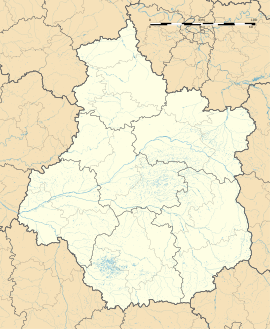Couture-sur-Loir (French pronunciation: [kutyʁ syʁ lwaʁ], literally Couture on Loir) is a former commune in the Loir-et-Cher department of central France. On 1 January 2019, it was merged into the new commune Vallée-de-Ronsard.[2]
Couture-sur-Loir | |
|---|---|
Part of Vallée-de-Ronsard | |
 Manoir de la Possonnière, birthplace of Pierre de Ronsard | |
| Coordinates: 47°45′16″N 0°41′19″E / 47.7544°N 0.6886°E | |
| Country | France |
| Region | Centre-Val de Loire |
| Department | Loir-et-Cher |
| Arrondissement | Vendôme |
| Canton | Montoire-sur-le-Loir |
| Commune | Vallée-de-Ronsard |
Area 1 | 14.3 km2 (5.5 sq mi) |
| Population (2019)[1] | 412 |
| • Density | 29/km2 (75/sq mi) |
| Time zone | UTC+01:00 (CET) |
| • Summer (DST) | UTC+02:00 (CEST) |
| Postal code | 41800 |
| Elevation | 54–136 m (177–446 ft) (avg. 70 m or 230 ft) |
| 1 French Land Register data, which excludes lakes, ponds, glaciers > 1 km2 (0.386 sq mi or 247 acres) and river estuaries. | |
It is situated in the northwest of the Loir-et-Cher department, 33 km (21 mi) to the west of Vendôme. It lies mainly on the left bank of the river Loir.
Geography
editCouture is in the canton of Montoire-sur-le-Loir, which corresponds to the historic Bas-Vendômois district.
Adjacent to the village centre (with a crossroad street pattern) or bourg are two parallel settlements, Le Poirier and more distinctly Le Pin.
Economy
editThe main industry (apart from farming and tourism) is gravel extraction; excavated areas have been adapted for water sports. A number of inhabitants are employed by the paper manufacturers at Bessé-sur-Braye (Sarthe).
History
editIt is first referred to as Villas culturas in a charter of the 9th-century bishop of Le Mans, Saint Aldric (earlier references are doubtless fictitious).
A partial source for the history of Couture in the later 17th century are the memoirs of Louis XIV's valet, Marie Dubois, who came from the village.
Population
edit
|
|
Sights
editThe housing reflects periods of prosperity and villégiature-type occupation in recent centuries.
Renowned for the Renaissance chateau of La Possonnière, birthplace of the poet Pierre de Ronsard,[3] the village also possesses an Angevin-style church dedicated to Saints Gervase and Protase. The church contains the tombstone of Ronsard's parents and is known for its spire.
Personalities
editNotable 20th-century inhabitants have included the Hallopeau and Sainte-Claire Deville families (noted scientists), the academic inspector Jean Pasquier and the Catholic historian François Lebrun. It is also the town where Pierre de Ronsard (1524-1585) was born.[3]
See also
editReferences
edit- ^ Téléchargement du fichier d'ensemble des populations légales en 2019, INSEE
- ^ Arrêté préfectoral 29 November 2018 (in French)
- ^ a b Saintsbury, George (1911). . Encyclopædia Britannica. Vol. 23 (11th ed.). pp. 691–693.



